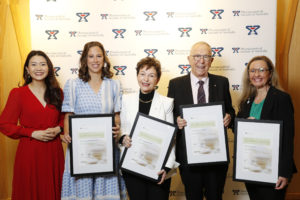PSA22: PSA President’s Opening Address
Transcript, check against delivery.

Good Morning PSA!
I’d like to extend a very warm welcome to each and every one for you. It’s great to see so many of you here today, in real life! Thank you, Raymond Weatherall, for that beautiful acknowledgement of country.
I would like to acknowledge the traditional custodians of the land we meet on, the Gadigal People of the Eora Nation. I also acknowledge the traditional custodians of the lands on which we all live and practise.
As we share our knowledge and learn from each other this weekend, may we also pay respect to Elders, past, present and emerging.
I’d like to welcome our Federal Minister for Health and Aged Care, The Honourable Mark Butler and our Assistant Minister for Mental Health and Suicide Prevention, and Rural and Regional Health, and pharmacist, the Honourable Emma McBride. I’d also like to welcome you our PSA members, PSA Board members, sponsors, award nominees, branch committees and our valued staff.
I’m thrilled to be here addressing you as your new PSA National President. The last two and a half years have been an incredibly tough time for our profession, and our community. But pharmacists, as a profession, stood up when it mattered. We showed agility, tenacity and reliability. We adapted and innovated our practice to meet the challenges of the pandemic and serve our health system.
The pandemic has highlighted community pharmacists role as essential primary healthcare providers, and we became the first point of contact for many in our communities. No matter what the circumstance, pharmacists continued to show up, serve and make a positive impact.
I am so proud to call myself a pharmacist, and I thank each and every one of my pharmacist colleagues for your work.
The work that we do day-in-day-out does not always get recognised, so today, could I please ask that you take two seconds now: turn to the person sitting on both sides of you, and say “thank you, you are amazing.”
One of my mentors once said to me, “if you don’t know what to say, just say it from your heart.” So today, I am going to speak to you all, from my heart – with three stories I’d like to share – the first is about The Triple Whammy, the second is about The Sleeping Beast, and the third is about The Starfish, Little Boy and the Old man.
Now The “triple whammy” is not what you think – it’s not about the concurrent use of ACE or ARB, a diuretic and a NSAID.
The triple whammy I am referring to is the triple whammy of my life – it’s age, gender and cultural background. At 36, I am young, relatively speaking, and am often told I look younger than I am. I am a woman. And I’m from a diverse cultural background – English was my second language. These are all things, disappointingly, that I have had to “overcome” in my life – professionally and socially.
If you share one of more of these whammies, my message to you is to focus on the things we can control – developing our professional skills, cultivating a growth mindset, and building our resilience.
I feel deeply humbled and grateful that our PSA Board has a progressive and contemporary outlook, and we work as a team.
The triple whammy we should be known by is our capability, courage, and compassion. It is up to all of us to embody these qualities every day. So, next time when we look at someone, put their age, gender and diversity to a side, and focus on their qualities – their capability, courage and compassion.
Now, onto the Sleeping Beast story. Our immediate past President A/Prof Chris Freeman once told me that PSA was like a giant “sleeping beast”, and it was his job to awaken the beast.
Chris has led our profession through an incredibly tumultuous time, a time in which we have seen rapid and drastic changes to our practice, and to how we connect with our colleagues and communities.
Despite these challenges, we have seen some huge developments for the pharmacy profession under Chris’ leadership:
- Medicine Safety was recognised as a National Health Priority Area by the Federal Government – bringing it to the forefront of national health policy.
- PSA launched our Medicine Safety series, with four reports published so far, and our fifth to be launched today.
- We secured the largest spend on pharmacy outside of the Community Pharmacy Agreement, with the Federal Government committing $345.7 million to fund onsite pharmacists in residential aged care facilities – thank you Minister for honouring this commitment .
- And we’ve seen governments continue to expand access to vaccinations administered by pharmacists – with over 8 million COVID-19 vaccinations and 2.5 million influenza vaccinations this year – an 88% increase on this time last year! No wonder we are all exhausted!
Well Chris, we all agree you have well and truly woken the beast! The last three and a half years with you at the helm of PSA have been marked with wisdom, decorum and determination. And for that, we thank you.
Now it is my job to feed the beast dexamphetamine, so that we may hear the beast ROAR. By focusing on our core purpose, and the needs of you, our members – and by involving you in our core advocacy – together, we can take our profession to even greater heights!
This brings me to my third story – The Starfish, The Little Boy and The Old Man. This is one of my favourite childhood stories, adapted from The Star Thrower by Loren Eiseley.
An old man was walking on the beach one morning. On this particular morning the beach was littered with starfish as far as the eye could see, as a big storm had passed through the night before.
Up ahead he could see someone moving, like a dancer. As he got closer, he saw that it was a young boy, picking up starfish and gently throwing them back into the ocean.
“Why are you throwing starfish into the ocean?” he asked as he approached.
“The sun is up, and the tide is going out. If I don’t throw them in they will die.” The child replied.
“But, do you not realise there are many miles of beach and thousands of starfish? I’m afraid you won’t really be able to make much difference.”
The young boy listened politely, then bent down, picked up another starfish, and threw it into the ocean.
He turned, smiled and said, “It made a difference for that one!”
I am sure you can see where I am going with this story! We are all that little boy, and our patients are the thousands of starfish. It can often feel overwhelming when we are trying to do so much, for so many.
Often, a key element that determines success, is the ability to see the positive in every situation and capitalise on that as your opportunity to make an impact. In the same situation, one person might see obstacles, another will see opportunity.
Be the one that sees the opportunity! And remember, we are making a huge difference in each and every one of our patients lives, every single day!
We need to come together as pharmacists, and work collaboratively with the healthcare sector more broadly, so that we, as a profession, can make an even greater impact on the health and wellbeing of Australians.
I look forward to working with our government and the Department so that pharmacists can play an even greater role in our health system. My immediate advocacy priorities are:
- Furthering our medicine safety agenda;
- Implementing the Onsite Aged Care Pharmacist Program;
- Integrating community pharmacists into primary healthcare;
- Improving pharmacist remuneration and driving workforce capability;
- And leading PSA to have a global impact and fulfil our social responsibility to our region.
Now, it is my great privilege to officially launch the fifth report in PSA’s Medicine Safety series, Medicine Safety: Disability Care.
Approximately 4.4 million Australians live with a disability, and many of these Australians require complex medical care. Our report highlights the barriers to safe medicine use, ranging from prescribing and dispensing, to administration, and medication management.
The result is a health system that is failing Australians with a disability.
We need to place a greater focus on medicine safety to help address the health and life expectancy gap in this vulnerable population – as we have been working to achieve for our aged care population.
This report makes a number of recommendations to improve safety across the disability sector and demonstrates the clear and pressing need for pharmacists to be engaged in medicine safety for people with a disability.
It is absolutely crucial that pharmacists be recognised as an essential service provider for people with special medicine needs, and that pharmacists be embedded wherever medicines are used.
I would like to thank everyone who has contributed to this important piece of work.
I look forward to working with governments, the disability sector, patients, and their families to improve the provision of care for Australians with a disability.
That brings me to the end of my address today. I hope that you find this weekend informative and thought-provoking, and you enjoy the opportunity to reconnect with your colleagues face to face!
I’d now like to introduce our new Federal Minister for Health and Aged Care, the Hon Mark Butler. Minister Butler has been a member of parliament since 2007. He served as Minister for Ageing and Minister for Mental Health in the Gillard Government.
He has just wrapped up the Albanese Government’s first parliamentary sitting week in Canberra this week, so we are incredibly grateful to have him join us here today.
Please welcome – Minister Butler.





